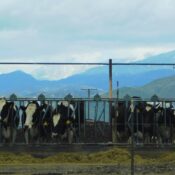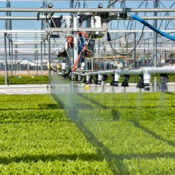
The Importance of a Happy Farm: Tips for Creating a Positive Environment for Livestock
Farming plays a crucial role in providing us with food and other agricultural products. The well-being and happiness of livestock on a farm are vital for maintaining a sustainable and productive environment. In this article, we will explore the significance of a happy farm and provide valuable tips for creating a positive environment for livestock.
The Relationship Between Animal Happiness and Farm Productivity
A happy farm is not just about the well-being of the livestock; it also directly affects the overall productivity and profitability of the farm. Content and happy animals tend to be healthier, more resilient to diseases, and exhibit better reproductive performance. They also have improved growth rates and higher-quality products. Therefore, creating a positive environment for livestock should be a top priority for farmers.
Creating a Comfortable Living Space for Livestock
Designing Well-Structured Shelter
Livestock require suitable shelter that protects them from extreme weather conditions such as excessive heat, cold, wind, or rain. The design of the shelter should consider the specific needs of each type of animal and provide adequate space for comfortable movement.
Ensuring Sufficient Space
Overcrowding can lead to stress, disease spread, and aggression among livestock. Providing sufficient space for each animal to move, lie down, and interact with others is essential for their well-being. Properly managed stocking densities contribute to a positive farm environment.
Providing Adequate Ventilation and Lighting
Good ventilation helps maintain fresh air and control temperature and humidity levels inside the shelter. Sufficient natural light or well-designed artificial lighting systems ensure proper visibility, support the animals' circadian rhythms, and contribute to their overall well-being.
Maintaining a Balanced and Nutritious Diet
Understanding Livestock Nutritional Needs
A well-balanced diet is vital for the health and happiness of livestock. Farmers should have a clear understanding of the specific nutritional requirements of each species and provide appropriate feed compositions to meet those needs. Consultation with a veterinarian or animal nutritionist can help optimize the animals' diet.
Offering a Variety of Feed Options
Livestock benefit from a diverse range of feed options. Providing a variety of high-quality forage, grains, and supplements not only promotes better nutrition but also keeps the animals mentally stimulated. It is important to ensure a steady supply of fresh and clean water as well.
Implementing Regular Feeding Schedules
Establishing regular feeding schedules helps animals maintain a routine and reduces stress. Consistency in meal times creates a sense of security, as the animals can rely on predictable access to food. Farmers should monitor feed consumption to detect any irregularities or potential health issues.
Promoting Health and Hygiene
Regular Veterinary Check-ups
Routine veterinary check-ups are crucial for early disease detection and prevention. Regular physical examinations, vaccinations, and parasite control programs should be implemented to safeguard the health of the livestock. Prompt treatment of any health issues ensures a happy and thriving herd.
Implementing Vaccination Programs
Vaccinations are essential for preventing infectious diseases. Consult with a veterinarian to determine the appropriate vaccination schedule for each species on the farm. Vaccinated animals are less likely to fall ill, reducing stress levels and promoting a positive farm environment.
Maintaining Cleanliness and Sanitation
Cleanliness and proper sanitation are fundamental in maintaining a healthy and happy farm. Regularly clean and disinfect animal housing areas, feeding equipment, and water sources to minimize the risk of disease transmission. Adequate waste management systems are also essential for preventing pollution and ensuring a clean environment.
Implementing Stress-Reducing Measures
Reducing Noise Levels
Excessive noise can cause stress and anxiety among livestock. Minimize loud noises from machinery, vehicles, or nearby construction to create a calm and peaceful environment. Well-insulated shelters can help reduce noise levels and provide a tranquil atmosphere for the animals.
Minimizing Handling Stress
Gentle handling techniques should be employed when working with livestock. Avoid unnecessary roughness or sudden movements that can frighten or stress the animals. Proper training of farm personnel in animal handling is crucial for maintaining a positive relationship with the livestock.
Ensuring Social Interaction
Livestock are social animals that thrive on interaction with their own species and humans. Encourage socialization by providing adequate group sizes and arranging opportunities for social interaction. Regular human presence and positive interactions build trust and create a positive farm environment.
Providing Ample Opportunities for Exercise and Enrichment
Designing Spacious Outdoor Areas
Livestock should have access to outdoor areas where they can move freely, graze, and engage in natural behaviors. Well-designed pastures or paddocks with proper fencing and shade provide a stimulating environment for the animals to explore and exercise.
Introducing Enrichment Activities
Enrichment activities help prevent boredom and improve the mental well-being of livestock. Providing objects for them to interact with, such as scratching posts, hanging toys, or puzzle feeders, keeps the animals engaged and content. Rotating and varying enrichment items regularly maintains novelty.
Encouraging Natural Behaviors
Allowing livestock to express their natural behaviors contributes to their overall happiness. For example, providing structures for climbing, perching, or scratching enables animals to engage in their instinctive behaviors. Observing and understanding the natural behaviors of each species is crucial for creating a positive environment.
Building Positive Relationships with Livestock
Developing Trust and Bonding
Establishing trust and bonding with livestock is important for their emotional well-being. Spending time around the animals, speaking gently, and using positive reinforcement techniques helps build a strong connection. Calm and patient interactions foster a sense of security and contribute to their happiness.
Using Gentle Handling Techniques
Proper handling techniques are essential for minimizing stress and avoiding unnecessary harm to the animals. Move calmly, avoid sudden movements, and handle livestock with care and respect. This approach fosters trust and maintains a positive relationship between the animals and the farmer.
Implementing Positive Reinforcement
Positive reinforcement, such as using treats or rewards, can be an effective training tool for livestock. By associating desired behaviors with rewards, animals become more responsive and cooperative. Positive reinforcement techniques create a positive learning environment and strengthen the bond between humans and livestock.
Conclusion
Creating a happy farm environment for livestock is vital for their well-being and the overall productivity of the farm. By prioritizing their comfort, nutrition, health, and mental stimulation, farmers can ensure that their animals thrive. Implementing measures to reduce stress, provide exercise and enrichment, and build positive relationships fosters a positive and harmonious atmosphere on the farm.
FAQs
Q1: How does the happiness of livestock affect farm productivity?
Livestock that are content and happy tend to be healthier, exhibit better reproductive performance, and have improved growth rates, leading to increased farm productivity.
Q2: What role does nutrition play in the well-being of livestock?
A well-balanced and nutritious diet is essential for the health and happiness of livestock. It supports their growth, immunity, and overall vitality.
Q3: How can farmers reduce stress levels in livestock?
Farmers can reduce stress levels in livestock by minimizing noise, using gentle handling techniques, and providing opportunities for social interaction and natural behaviors.
Q4: Why is it important to build positive relationships with livestock?
Building positive relationships with livestock helps foster trust, reduces stress levels, and creates a harmonious environment. It also improves cooperation during handling and management activities.
Q5: What are some examples of enrichment activities for livestock?
Enrichment activities for livestock can include providing objects for interaction, such as scratching posts, hanging toys, or puzzle feeders, and creating environments that allow for natural behaviors, like climbing or perching.
Recent Posts
Unlocking the Potential of Your Farm with USAG
+1 (805)-455-7524
info@usagfarm.us



